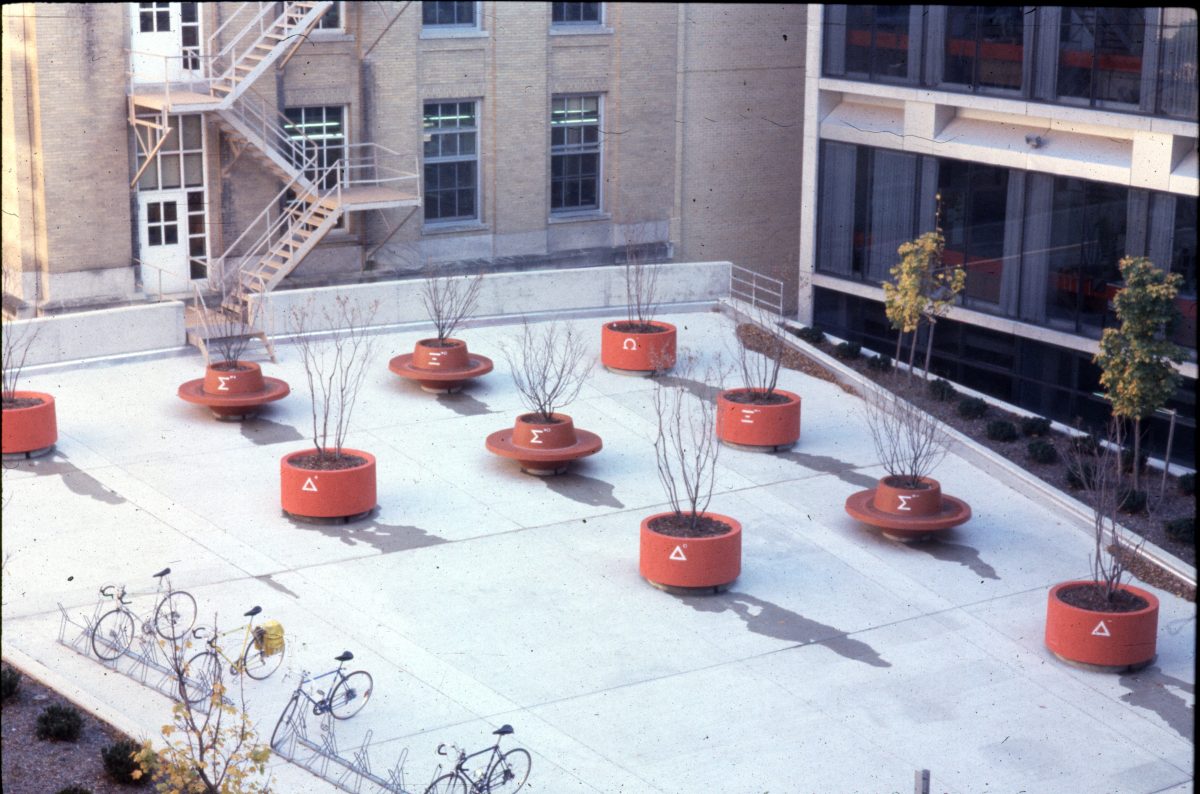Professors Tulika Bose and Maxim Vavilov have been elected 2019 American Physical Society Fellows. The APS Fellowship Program recognizes members who have made exceptional contributions to the physics enterprise in physics research, important applications of physics, leadership in or service to physics, or significant contributions to physics education. Each year, no more than one half of one percent of the Society membership is recognized by their peers for election to the status of Fellow in the American Physical Society. This year, 168 Fellows were selected and recognized for their contributions to science. Congrats, Tulika and Maxim!
Uncategorized
Flashback: 1978 Chamberlin and Sterling Courtyard/Camerini Decuplet – recognize your bike?

Megan Tabbutt and Aedan Gardill earn NDSEG fellowships
Congrats to second-year grad students Megan Tabbutt and Aedan Gardill, both in the Kolkowitz Group, on earning National Defense Science and Engineering graduate fellowships! The awards provide up to three years of funding for these students to pursue their research projects, which they describe below:
Megan Tabbutt
Optical atomic clocks are now the most precise time keepers in the world, keeping time to better than one second over the age of the universe. With support from the NDSEG, I will work with my collaborators to build a new “multiplexed” strontium optical lattice atomic clock, which will consist of two clocks in one vacuum vessel. We will use this new kind of clock to perform tests of Einstein’s theory of relativity, such as measuring the relativistic effects of gravity on the passage of time at the millimeter scale, which may one day have applications ranging from the prediction of volcanic eruptions to water resource management and flood prevention. We will also engineer strong interactions between the atoms that make up the clock to generate entangled states for quantum enhanced clock performance, among other pursuits.
Aedan Gardill
Superconducting qubits are a promising system for quantum computing, but external sources of “noise” currently limit their usefulness. A better understanding of the sources of this noise in the qubits should help advance quantum computing efforts. With the NDSEG fellowship, my research will focus on using nitrogen vacancy centers in diamond as sensors with nanometer-scale resolution. We will develop and apply novel sensing techniques to study interesting solid state systems, such as investigating the origins of noise that currently limit superconducting qubit performance.
Department welcomes congressional staffers
The Department of Physics was one of many departments on campus visited by senior staffers from Wisconsin’s US Senators’ and Representatives’ offices. They toured the Eriksson, Saffman and Kolkowitz labs, then visted the MST and Big Red Ball with Prof Forest. It was a great opportunity to show them how federal research dollars were being put to use to advance important work in the department.
Daniel Freedman MS’62 Phd’64 wins special Breakthrough Prize
Alum Daniel Freedman, MS ’62 PhD ’64, recently won a Special Breakthrough Prize in fundamental physics. He shares the prize with Sergio Ferrara and Peter van Nieuwenhuizen.
Making biominerals: nature’s recipe is old, evolved more than once
In a report published today Aug. 19 in the Proceedings of the National Academy of Sciences (PNAS), a team led by Pupa Gilbert, a University of Wisconsin–Madison professor of physics, shows that the recipe for making shells, spines, and coral skeletons is not only the same across many modern animal lineages, but is ancient – dating back 550 million years – and evolved independently more than once.
Researchers recreate the sun’s solar wind and plasma “burps” on Earth
A new study by University of Wisconsin–Madison physicists mimicked solar winds in the lab, confirming how they develop and providing an Earth-bound model for the future study of solar physics.
The Big Red Ball was turned into a laboratory model of the Sun
Prof. Francis Halzen awarded 2019 Yodh Prize
Professor Francis Halzen, PI of the IceCube Neutrino Observatory, was awarded the 2019 Kanwal & Gaurang Yodh Prize at the 2019 International Cosmic Ray Conference. He was honored for “his leadership and landmark contributions that cleared the path for the emergence of neutrino astronomy.”
Multimessenger collaboration between the Dark Energy Survey and IceCube leads to sensitive search for cosmic neutrino sources
Over the past two years, scientists in the Dark Energy Survey (DES) have been following up realtime neutrino alerts from IceCube with deep optical telescope imaging in search of supernovae that might be the origin of high-energy astrophysical neutrinos.
Physics researchers with the Wisconsin Quantum Institute earn $4M DOE grant
Researchers at the Wisconsin Quantum Institute (WQI) have been awarded a US Department of Energy grant to study the noise that hampers advances in quantum systems, including quantum computers.
The three-year, $4 million funding will allow the researchers to apply emerging tools to identify new materials and fabrication methods that can improve the performance of these systems.